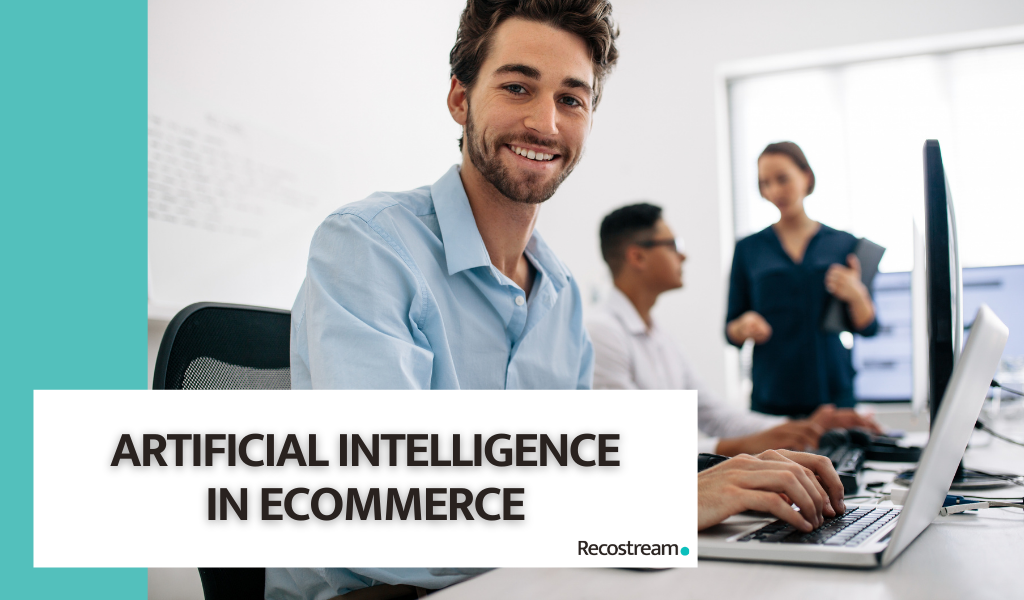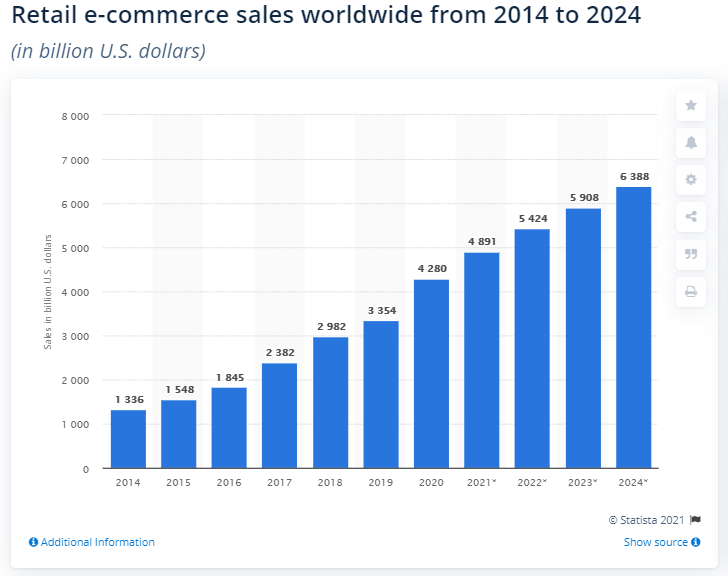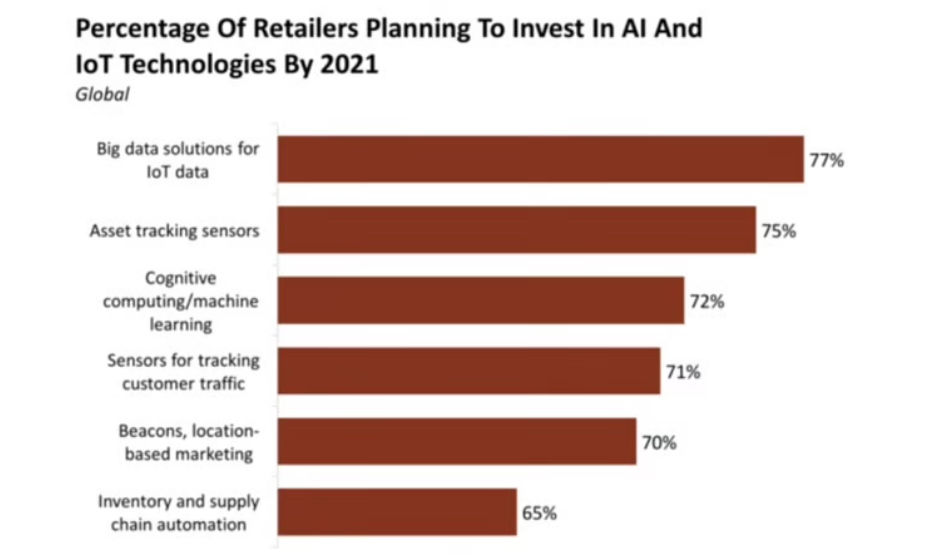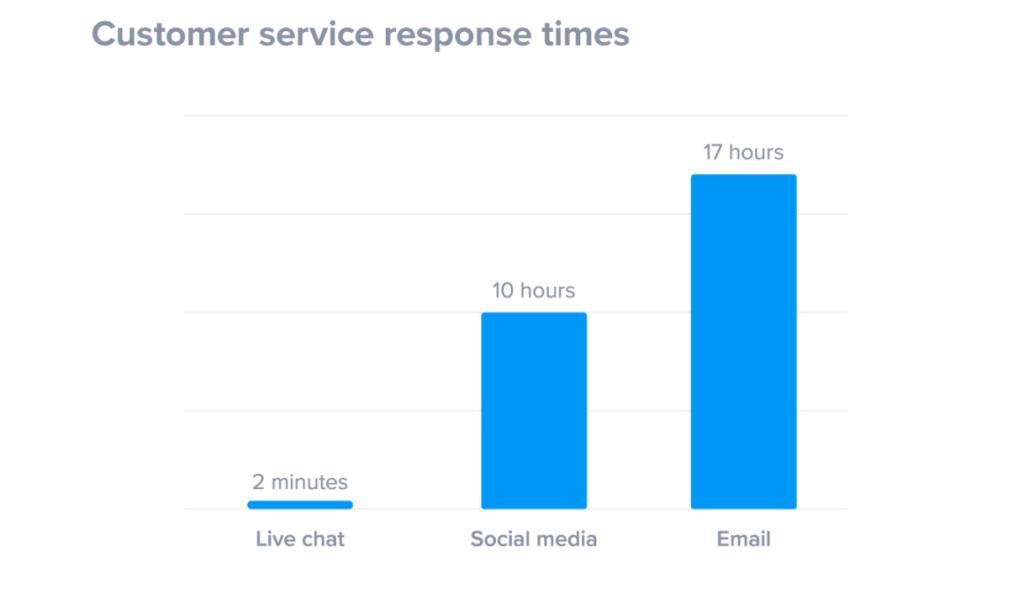Artificial Intelligence in Ecommerce: 10 Examples of Using AI in Online Stores

About 5 years ago omnichannel strategy, running social media channels or influencer marketing were very important trends in eCommerce. In 2021, artificial intelligence is undoubtedly the factor with the greatest impact on the development of eCommerce websites.
In today's article, we will answer the following questions:
- Is artificial intelligence in eCommerce indispensable today?
- How do online stores now use artificial intelligence?
- What benefits do online stores gain from using AI?
- What artificial intelligence tools can increase online sales?
- What are some examples of the use of AI in eCommerce?

Why is the use of artificial intelligence in eCommerce important?
Technology based on artificial intelligence has recently developed to such an extent that it has become an essential element of the largest online stores on the web.
Given this progressive trend, many eCommerce companies have started using various AI tools to better understand their customers' buying behavior..
This knowledge is extremely valuable as it helps to improve::
- customer experiences,
- offering users products tailored to their needs,
- identifying competition strategies,
- forecasting demand and supply.
Until recently, artificial intelligence was reserved entirely for the largest players on the market (like TikTok), mainly due to the high cost of R&D. For several years, however, ready-made tools and solutions for small and medium-sized stores have started to appear, enabling them to use this revolutionary technology.
Competition on global eCommerce markets has skyrocketed to a record level.
It is estimated that there are between 12 and 24 million eCommerce sites worldwide and more are created every day.
Obviously, this does not mean that there is no longer any room for new online sales companies. They just have to remember to stand out from the competition and artificial intelligence is a great way to do that.

It is predicted that in the next few years, artificial intelligence will start to develop at an even faster pace than before.
What can an AI investment in eCommerce bring?
Corporations such as Google and Microsoft are already planning to invest another billion dollars in new initiatives related to artificial intelligence..
Google recently purchased a $ 550 million start-up called DeepMind, dedicated to the development of artificial intelligence and machine learning. This cooperation is to help find further practical and revolutionary applications of this technology.
In addition to autonomous cars or intelligent assistants, the eCommerce market is also a very important arena for AI development.
The best example here can be the global eCommerce giant, i.e. Amazon, which has already been using artificial intelligence in three extremely important aspects of its business:
- Intelligent product recommendations - an advanced algorithm based on the technique of collaborative filtering has long been recognized as one of the best on the market.
- Logistics management - Amazon's artificial intelligence is largely responsible for redirecting delivery truck routes, adjusting the arrival time of consignment and making adjustments for the accuracy and efficiency of the entire logistics system.
- Natural Language processing (NLP) - this technology based on artificial intelligence is currently used by the intelligent purchasing assistant - Amazon Alexa.
All these innovations introduced by the American eCommerce giant have already generated revenues of millions of dollars.
However, artificial intelligence is not exclusively used by the largest companies in the industry.
The vast majority of online retailers are already planning to invest in AI-based solutions to support their business.
.png)
A survey conducted by Business Insider shows that soon up to 85% of interactions with customers will be managed without human intervention.
What is more, it is expected that in the year 2022 majority of large enterprises will run an average of up to 35 projects using artificial intelligence and even 75% of managers fear that if they do not start using AI in their business in the next 5 years, they may fall by the wayside.
This demonstrates how important this technology is, especially on the Internet sales market, and companies that do not use it yet may be falling behind the competition.
10 examples of the use of artificial intelligence in eCommerce
There are many areas of online stores where artificial intelligence and machine learning technology can be used, positively affecting the operation of the entire website.
We've listed the top 10 below.
1. Logistics in the online store
Effective inventory management is about maintaining an adequate level of inventory that can meet the market demand without increasing idle inventory.
This is an extremely difficult and time-consuming task because it requires constant monitoring of a huge amount of data, especially in larger online stores.
Due to this, artificial intelligence and computer algorithms turn out to be much faster and more efficient than even the best experts in the field of logistics.
While the conventional form of inventory management was limited to current inventory levels, inventory management using AI enables inventory to be maintained based on data related to:
- sales trends in recent years;
- expected changes in demand for products depending on the season;
- potential supply problems that may affect inventory levels.
The ideal solution for most companies will be a real-time inventory management system that can respond to current customer orders.
An AI-powered standalone inventory solution is a very attractive alternative that helps online retailers avoid the shortage of inventory issues.
2. Natural Language Processing (NLP)
Natural Language Processing, or NLP for short, is generally defined as the part of artificial intelligence that deals with the automatic analysis of natural language, i.e. speech and text, using intelligent software.

The eCommerce sectors were among the first to put natural language processing (NLP) into practice.
Online stores started with the introduction of chatbots and conversational interfaces and other solutions to improve the customer experience started to be developed.
Customers can describe the product they are looking for in a virtually endless number of different ways, while online stores have a specific number of keywords they use. This is yet another area where NLP is extremely helpful.
Thanks to natural language processing, machines can easily select the phrases and words used by users when searching for a specific product. This significantly improves the user's interaction with the store and makes it faster for the user to find the product they are interested in.
3. Product recommendations
Systems of personalized product recommendations are among the main uses of artificial intelligence in eCommerce.
These systems have long been used by the largest eCommerce websites on the market, such as Amazon or Allegro, to suggest products to customers that they might like.
However, with the development of comprehensive solutions such as Recostream, this technology has also become available to smaller stores.

There are many advantages of using recommender systems in an online store.
Research found that personalized recommendations were able to improve conversion rates by up to 915% and average order values by 3% on average. Moreover, revenues from stores where customers were recommended products accounted for 26% of total revenues.
For the average online store, this means an increase in monthly profits by thousands of zlotys.
These numbers actually show that product recommendations based on artificial intelligence are a great way to improve sales and customer experience in your store.
4. Intelligent Search
Research shows that the website search function is used by up to ⅓ of all visitors to an online store and 30-60% of revenues of online stores come from products presented by search engines.
Taking this into account, the search engine needs to work quickly, smoothly and should anticipate the next step of the user in order to be effective.
Again, artificial intelligence turns out to be the solution to this problem.
Solutions supporting store search engines are able to predict in real time what a given customer has in mind and even after entering a phrase that is not very precise, show the products they are interested in.

Based on the Ecommerce Trends 2021 Survey Report, 68% of industry leaders plan to improve search on their sites in 2021. It creates a very good opportunity to use artificial intelligence in your store so as not to stay behind the competition.
5. Personalization of the shopping journey
It has long been known that improving customer experience results in higher revenues for eCommerce companies and personalization is the most important tool to accomplish this goal.
Ecommerce personalization is the process of delivering experiences tailored to the personal needs of customers on online shopping sites.
This is done by:
- dynamic content display,
- product recommendations,
- specific offers based on previous activities, browsing behavior, purchase history, demographics and other personal information about users.
Artificial Intelligence, specifically machine learning, is the only way to ensure a high level of online personalization.
Algorithms analyze customer data and behavior to adapt the content on the page to each site visitor.
Currently, the most important and easiest way to improve the personalization of an online store, using artificial intelligence, are personalized product recommendations. Thanks to them, potential customers on most of the store's tabs will be displayed special offers tailored specifically to their needs in real time.
The biggest advantages resulting from the improved personalization of the store include, among others increased user engagement, improved customer retention and increased sales..
6. Dynamic pricing
One of the less frequently used methods, especially for new online store owners, is the use of artificial intelligence for dynamic pricing.
Dynamic pricing is a flexible pricing strategy based on a variety of factors, including market demands, price constraints, and seasonality.
A good dynamic pricing strategy allows you to quickly adjust the prices of the offered assortment, while collecting valuable statistical data.
This means that prices will no longer be established based exclusively on the amount of stocks. Artificial Intelligence allows the use of a series of advanced analyzes regarding the product, customers and competition to determine the best price at a given moment.
Intelligent dynamic pricing system is able to predict market behavior or notice that, for example, a competitor has low inventory, which can be a good opportunity to raise prices and increase revenues without reducing demand.
7. Chatbots
One of the most popular and oldest uses of artificial intelligence in online stores are chatbots.
eCommerce chatbots work, analyze the written text, using a special algorithm to find out what a given customer wants and then provide the best answer.
They use artificial intelligence and machine learning to communicate with people. Users are free to write or speak on the platform and the bot will respond accordingly.
They understand questions and commands (to a certain extent) and over time, due to machine learning, they will become more intelligent and provide better answers.

The biggest advantages of intelligent chatbots include: saving time and increasing customer confidence.
Statistics show that about 61% of online store customers use various types of text messaging services.
Using an intelligent chatbot can therefore be a great way to improve the user experience and help them find answers to their questions about shopping in a given store.
8. Search by image
Probably the most important sense of a human is the sense of sight. People identify images in as little as 13 milliseconds and 90% of all information the brain receives is visual information.
Due to this, one of the biggest trends that will play a significant role in the eCommerce market in the future will be image search.
Based on artificial intelligence, visual search technology uses images such as snaps, screenshots, images available on the Internet, etc. to find products of interest to users.
The biggest challenge is to make the system understand what is in the image and then search for the appropriate results.
All this is done thanks to the magic of artificial intelligence. This technology will find wider application on the eCommerce market in the future, especially in the clothing and interior design industry.
Currently, only 8% of retailers have a built-in image search engine on their eCommerce sites.
On the other hand, research in the US and UK found that as many as 62% of millennials expect visual search to be introduced to a larger number of online stores more than any other new technology.

It is estimated that by the year 2021, brands that customize their sites and offer visual and voice search options to customers (such as Google Home and Amazon Alexa) will increase eCommerce revenues by up to 30%.
9. Automated customer service
Artificial intelligence in the future may also significantly improve the customer service process in online stores.
In addition to the already mentioned intelligent chatbots, which, using AI, are always available to users, artificial intelligence can also be used in other support areas.
Automation of sales and customer relations became a trend in 2017. Since then, the amount of data collected by companies about users has grown at an incredibly fast pace.
Customer relationship management systems must therefore keep up with this trend and take full advantage of the information collected.
The existing, classic CRM systems are not very good at dealing with large amounts of data.
The main problems associated with these solutions are:
- Manual data entry creates a risk of making a mistake,
- No access to KPIs,
- Lack of connectivity between CRM data and data from other company systems.
CRM systems based on artificial intelligence technology try to solve all these problems.
Currently, major suppliers of customer relationship management systems, including Salesforce, SAP, Oracle, Microsoft and Adobe, have introduced AI and machine learning elements to their existing systems.
10. Personalized emails
Email is one of the most popular means of digital communication and there is a reason why using it for marketing activities can prove extremely effective.
While many brands are now focusing on social media as their primary means of business communication, it turns out that email campaigns are still one of the most effective marketing strategies in 2021.
To increase the effectiveness and attractiveness of mailing campaigns, the best choice is to introduce personalized elements to them.
The use of artificial intelligence to send each customer a message with a promotion or information tailored specifically for them will certainly prove to be a good strategy.
Research has shown that emails with personalized content are 26% more likely to be opened. Moreover, and Rich Relevance has shown that revenue from personalized mailing campaigns is as much as 5.7 times higher for standard messages.
Thanks to personalized email marketing based on artificial intelligence, campaigns can bring much better results.
The most important benefits of using artificial intelligence in email marketing include:
- Personalized messages seem much more human,
- AI campaigns are characterized by increased customer retention,
- The hours of sending messages and their content can be adjusted to the location of a given user
- Customer responses and reactions to personalized messages are continuously collected and analyzed by the system.
Let's summarize
This is certain. Artificial Intelligence technology will have a huge and undoubtedly beneficial effect on the eCommerce industry in the years to come. What will change is the way how consumers find products online and how they interact with shopping sites.
Artificial intelligence enables eCommerce marketers to analyze millions of interactions each day and target tailored offers to each customer individually.